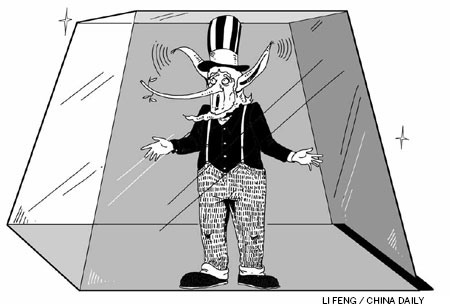Will US explain Snowden case to the world?
 0 Comment(s)
0 Comment(s) Print
Print E-mail Xinhua, July 14, 2013
E-mail Xinhua, July 14, 2013

Former U.S. spy agency contractor Edward Snowden sought political asylum in Russia Friday at a closed-door meeting at Moscow airport with human rights activists, lawyers and officials.
While the fate of the whistleblower, who exposed the U.S. surveillance program, is a point worthy of attention, a more important question is whether the United States will explain its suspicious monitoring activities to the world.
Analysts say recent developments indicate Washington is adamant in maintaining its position on the issue and showing no sign of an apology or regret. Nevertheless, the Snowden's revelations have already alerted other countries to keep a closer eye on national cyber security.
US unlikely to change course
Observers say, despite criticism and protests from various sides, it is highly unlikely the United States will make substantial adjustment to its intelligence programs.
So far, U.S. President Barack Obama, Secretary of State John Kerry and many senior intelligence officials have defended the surveillance program, saying it is aimed at overseas targets and not U.S. citizens, that it was approved and supervised by the U.S. legislative, judiciary and executive branches, and that it has made important contributions to counter-terrorism and U.S. allies.
Analysts say the Obama administration faces little domestic pressure on the issue as it labeled the program with the buzzwords of "overseas targets" and "counterterrorism".
Except for a few lawmakers, who have demanded a full review of the program and whether it has infringed the privacy of its citizens, U.S. Congress has showed unusual unity this time in supporting the surveillance program. This has given Obama plenty of space in which to avoid explaining its actions to the international community.
It has been a long tradition for the United States to treat domestic and foreign surveillance targets differently. The American public pay more attention to their own privacy rights than that of overseas targets.
David Rothkopf, CEO and editor-at-large of the Foreign Policy Group, wrote in an article recently that U.S. congressional and executive branch officials have bought into the post 9/11 paranoia and hyped-up threat mentality and come to accept that even the possibility of an attack on the United States warrants disregard for U.S. laws and international agreements.
There is little chance the United States will make significant changes regarding its secretive surveillance program.
Jean-Marc Manach, a French Internet expert, told Xinhua recently that monitoring international communications has become a huge "business" in America. Nearly five million jobs in the United States are related to covert defense, including 500,000 private contractors. Many private firms have prospered thanks to the surveillance business.






Go to Forum >>0 Comment(s)